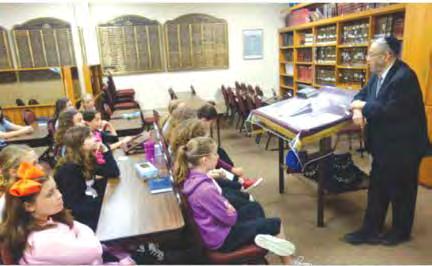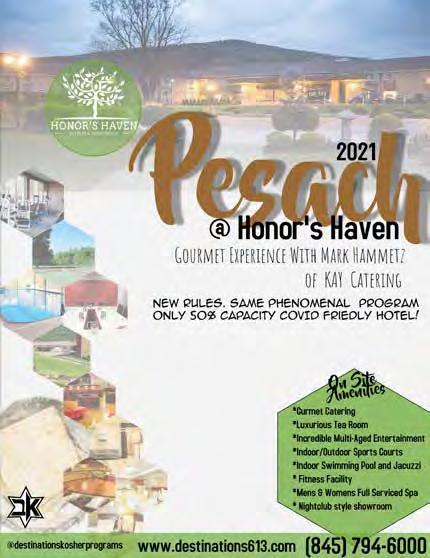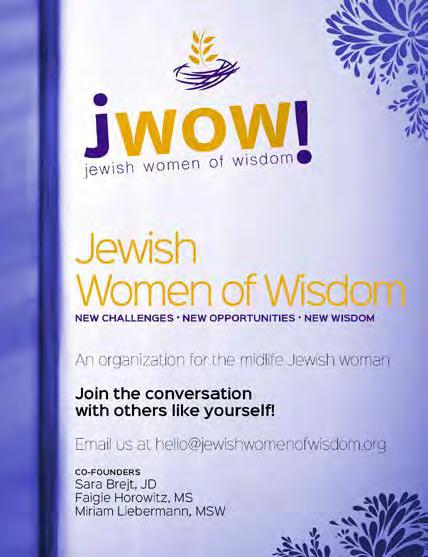
8 minute read
Remembering Rabbi Yehuda Kelemer by Elana Jacobs
Remembering Rabbi Yehuda Kelemer
On His Shloshim
By Elana Jacobs
This Sunday, marks the shloshim of the mara d’asra of the Young Israel of West Hempstead and more specifically, my rav, Rabbi Yehudah Kelemer, zt”l.
The loss is profound. Rabbi Kelemer’s gadlus encompassed so many areas. His persona bespoke warmth and caring. His smile radiated true simchas ha’chaim. He spoke to every person with admiration and respect. He had a wonderful sense of humor, injecting a funny comment into regular conversation as well as deep discussions, lightening the mood and bringing laughter and joy. His chessed was legendary. His commitment to Torah and Torah ideals propelled others to greater heights.
Throughout the years, I would call Rabbi Kelemer often with many varied shailos. He always had time for me as if he had all the time in the world. Never did I feel rushed. If he ever had to hang up the phone, it was always with an assurance that he would call me back.
Since I started teaching at the Hebrew Academy of Nassau County, HANC, ten years ago, it was a new tekufah where Rabbi Kelemer treated me like a partner in his avodas hakodesh. He knew I was “hands on” with the children of West Hempstead and HANC at large. He wanted me to reach them, teach them, prioritize their needs and treat them with great love, second only to the love and care I had for my own family.
Often on the phone, he would remind me that a mother needs to be well rested for her children and that I really should be going to sleep earlier. If my kids were yelling in the background, he would gently tell me, “It sounds like you have other obligations to take care of. They are your top priority. We don’t have to talk now. When’s a good time to talk?”
His clarity in knowing how to answer people in where they were holding was unique. He would tell me one thing but he didn’t expect the same of someone else and wouldn’t have even told them that answer. When he would tell me a machmir psak, he would gently motivate me to do it by saying, “We should always try to take the higher road.”
On the other hand, he did not push his psak on those who had not asked him. There was a situation in which someone did something I felt was highly inappropriate. I called Rabbi Kelemer and asked him his opinion. He told me what they did was wrong. I then asked him if I could tell the person how wrong they had been and he responded, “Absolutely not!” It seemed that since they had not asked me, I had no right to get involved.
I wanted to teach my students at HANC how great their rav was and that they could ask him shailos, too! Throughout the year, if a difficult question was raised, I would write it down, promising the girls at the end of the year we would have a question-and-answer session with Rabbi Kelemer. Rabbi Kelemer loved listening to their questions. He would turn every question into the greatest question ever asked, citing different sources and mefarshim to back up how incredible their shailos were. And, of course, he would insert his favorite refrain. This was a refrain I remember as a teenager from Rabbi Kelemer’s Q and A sessions with us. He would say, with a smile on his lips, and nachas in his heart, “Doesn’t anyone have any easier questions?”
At the end of each of these Q and A sessions, he would ask the children a thinking question usually based on the parsha. Asking thinking questions to the children was something he did for as long as I can remember. He wanted to encourage them to become thinkers. He wanted to hear their thoughts and ideas. I also felt he asked questions so the students would see how he cared for them, related to them, and wanted to engage them in meaningful conversation in Torah.
Rabbi Kelemer was a true ish chessed. Every person who knew him was touched many times by his unbelievable love, unwavering and deep commitment to his community members, their families and beyond. His chessed was a Toras chessed, stemming from his great appreciation and love for Torah and the mitzvos therein as well his natural ahavas Yisroel that radiated outwards to all fortunate enough to come within his daled amos.
He was at every simcha, and every sad occasion as well, offering words of sincere happiness at the good moments and comforting consolation in harder times. My husband is one of five brothers and one sister, ka”h. Getting to dance in front of the chosson and kallah at our wedding was no small feat as one had to “take on” the other brothers who were all dancing with vigor and enthusiasm. Watching the wedding video carefully, I noticed Rabbi Kelemer standing in the center of the circle, ready to be m’sameaich chosson v’kallah. After a few failed attempts to get in the middle, he was at last successful, dancing for us and giving us joy at that happy moment.
When my Bubby, a”h, sat shivah for her sister in my parents’ house, due to circumstances of a very short shivah on erev yom tov, she did not have a single visitor to be menachem avel. Except for Rabbi Kelemer. When my grandmother, a”h, passed away two years ago, Rabbi Kelemer’s guidance helped us with every small step along the way. When he came to be menachem avel my mother, I sat enraptured as he was able to get to the heart of my grandmother. He knew her well, my parents having been members of the West Hempstead community for over thirty years.
Here again was another testament to his great dedication. A community is comprised of people with families and family histories that are complex. Rabbi Kelemer knew all of the stories, understood deeply where people were coming from, and was able to guide them based on all of these sensitive factors.
Rabbi Kelemer lived a life of chessed as was apparent to one and all who knew him. He also taught me the importance of chessed through the following teachings:
During Hurricane Sandy, when I asked him why Hashem caused it to happen, he answered that it was so that people could do chessed for each other. (As was indeed the case in West Hempstead. Chessed abounded.) At the height of Corona, last March/April, when I asked him what our hashkafa should be, one of the answers he gave me was so that we should s-t-r-e-t-c-h ourselves to do more chessed towards others. He once said to me forcefully, though of course in his calm, even tone, “WE ARE HERE TO DO CHESSED!!” This was how he lived his life.
His true caring: A teenage relative of mine who lives in Eretz Yisrael disappeared. No one knew where he was, and a search party had been organized. When I got word about it, I was filled with fear, imagining the worst. In distress, I called Rabbi Kelemer to beg him to daven for the boy to be found. Rabbi Kelemer’s concern was immediately apparent when I told him the story. He said he would daven for the boy and would pass the name on to gedolim in Eretz Yisrael. He explained to me, “A gadol is someone who has a pocket for every Jew inside his heart.” That was who he was.
Of note: Within a half hour of my calling Rabbi Kelemer and giving him the name, the boy was found. To use Dr. Yossie Weisel’s words, was it a coincidence? Or did Rabbi Kelemer have a line directly to the Ribbono Shel Olam? I prefer to think the latter. On teaching: One of the themes I learned from the Rav throughout the years was how impressionable young children are and how I make an important roshem as their teacher. He stressed that the most important things in teaching are treating students like they are one’s own children and setting an example to them of the
bnei/bnos Torah they can become.
On family: I loved seeing the Rav together with his Rebbetzin, yblc”t. What a special couple. The two smiling together, attending simchas, wishing mazel tovs. Though small in physical stature, their spiritual stature towered above us all. When they attended a simcha, it truly elevated the whole occasion. What a zechus to have had both of them at so many of our simchas, bar/bat mitzvahs and weddings.
One of my students once asked Rabbi Kelemer why we still have the Kosel. Why did Hashem leave it standing? He answered that we should have a feeling, a taste of what the Mikdash is, and still be connected. It’s like an heirloom gem reminding us that Hashem has not disappeared. This idea gives me comfort as I mourn the loss of Rabbi Kelemer. I wonder, who will I go to? Who can answer me? I feel like a lost child searching for their brilliant and loving father to answer their questions and guide them through life.
It is my hope that the memories and lessons taught by Rabbi Kelemer, zt”l, will remain with me throughout my lifetime like a precious heirloom gem. I hope to be able to convey these lessons to my children and students as we work together to take the higher road.
Yehi zichro baruch.












